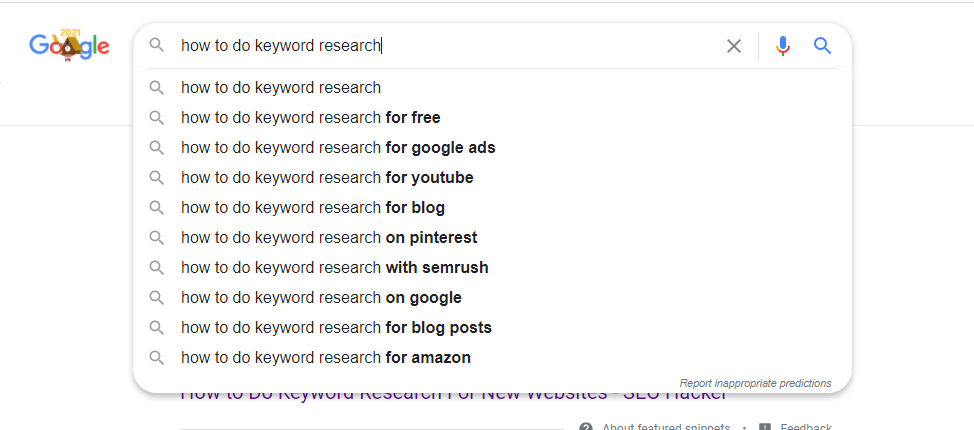If you are new to SEO, you might be wondering how to do keyword research for a new website and if you can rank well in Google with a new site. I have been doing keyword research long before I knew it was called keyword research. I stumbled into SEO and learned most of my skills through trial and error. If you have a new website or blog you might find SEO extremely difficult and confusing.
Every day I read comments from new bloggers and business owners saying that SEO is confusing, or “I have no idea how to do keyword research.” SEO is not nearly as difficult as you think.
Maybe you’ve tried to do keyword research for your website. You wrote a high quality post, keyword optimized it based on everything you’ve read about SEO, but still your post is nowhere to be found in Google.
The reason why keyword research is so challenging for new websites is because you’re competing against thousands of sites that already have backlinks, domain authority, and have years worth of content.
How do you compete as a newcomer?
One of the best ways to grow your search engine traffic when you have a new website is to stop trying to rank well for difficult keywords and start finding easier unique keywords to go after instead.

The problem is you are going after the wrong keywords and you are using the same methods everyone else is using to find them.
I am going to share my SEO strategy with you, how I built a successful content website before, and how I am growing my search engine traffic at Badass Web Goddess. If you discovered this post, you certainly found it in Google.
But why? The secret to finding good keywords is not in keyword tools, but in thinking like your audience and trying to come up with keywords your audience might search for.
Before I started Badass Web Goddess, I owned a very popular moms site. My SEO strategy included doing traditional keyword research and using keyword tools, just like you’re probably doing.
We went after a handful of high search volume keywords, like “baby names”. The high-volume keywords (or head terms) brought in a lot of search engine traffic, but took years to get ranked well in Google. These keywords were very hard to get to the top of Google, and keeping them in the top spot took a lot of work.
However, most of our search-engine traffic came from obscure keywords like “what is the corpus luteum?” If you were to use a keyword tool, “corpus luteum” would never be found and you certainly wouldn’t anticipate it bringing in a lot of traffic. Believe it or not, it was one of our best performing articles.
If you have a new website and want to get traffic right away, your focus should be on creating content that you can get to rank well in Google fast.
How do you find good keywords for a new website?
A good website will use a mix of keywords to get traffic from Google. Short-tail keywords are generally much more difficult to rank well for, but they also bring a higher search volume.
Long-tail keywords are easier and where you should focus most of your attention on when you have a new website. Once your website has some “link juice” and domain authority, you can start going after more difficult keywords.
Doing keyword research will help you to discover which keywords will bring in the most search volume and also help you determine how difficult they will be to get.
Start your keyword research by writing a brainstorm list
Start out by writing down every search phrase you can think of that your audience might use to find you. These phrases are called seed keywords. You can then use your list of seed keywords to generate more keyword ideas.
I suggest keeping a file and writing keywords down as you think of them. If you search for information for your business or blog, write down what you searched for. I write a blog on internet marketing. I search for SEO articles all the time. Every time I do a search for information, I write what I searched for down.
Your own Google searches are often your best ideas. Not only are they keywords you have searched for, but they are something you were interested in learning about. More than likely your audience will be interested in this too.
Ask your friends and family to brainstorm with you. By asking people what they search for you can come up with ideas you might not think of on your own or might not discover through traditional keyword research.
Read through Reddit, Quora, or Facebook groups for ideas. You can search for your seed words to see what kinds of questions people are asking. Jot down any good questions you see and use them as a guide for content ideas.
Research your keywords
Once you have a list of seed words, go look them up with a keyword tool. There are a ton of good keyword tools you can use, but my favorite free tool is Ubbersuggest. A keyword tool will tell you the search volume for your seed words and also give you keyword suggestions.
I work with a few insurance agents. My seed keywords for my insurance clients typically include auto insurance and car insurance. If you look up car insurance and auto insurance with a keyword tool you will see that “car insurance” gets searched more than “auto insurance.” I tend to optimize my insurance sites for long-tail “car insurance” keywords instead of “auto insurance” because it gets searched more.
You can use the search volume of a keyword to decide your strategy. Naturally, the higher the search volume, the more traffic the keyword will bring to your website. But there are other things to consider.

How do you decide which keywords to use?
When you have a new website, you want to choose keywords that are not competitive. Before you sit down to write something, you should do a Google search to see what’s already out there. Check out the competition. Has anyone else written the content you are thinking about? If so, how many articles can you find on the topic? How good are the articles that are already out there? Can you write something better?
I put a lot of thought into this blog post. I wanted it to be helpful to new website owners, but I also wanted it to rank well in Google. SEO blogging is a competitive market. Anyone who writes about SEO is competing with other SEO experts who know how to rank well in Google.
So how do I compete as a new website? I came up with a long-tail keyword that started from the seed words “keyword research”.
Here are some tips for generating good long-tail keywords
Start with your idea and then research it. Before you start writing anything, look to see how many articles are already out there and which sites rank well. This will help you determine how competitive your keyword is.
For this post, I did a search for “how to do keyword research” and almost every variation of that search pulled up the same results.
Here’s why. Google looks at a lot of ranking factors to determine which pages will get the top spot. Page speed, domain authority, how much direct traffic the site gets, and the quality of the website. There are some excellent SEO blogs out there. In order for me to compete for a top spot in Google, I needed to come up with a keyword strategy that would work well for a new website.
Google is a very sophisticated search engine. Their goal is to deliver the best, most up-to-date, and useful information to the people searching. Google identifies which sites have quality content and how relevant their content is based on what the user does once they land on a page. If a website has great content and the user stays on the page to read it to the end, their pages will rank better in Google.
With that in mind, I set out to create a quality, useful post, but one that was different from what was already out there. My goal was to provide unique information to help new website owners learn how to rank better in Google.
How do you use keyword research to come up with a good keyword title?
I have a few tricks I have used for years. I often use Google’s autocomplete to come up with long-tail keywords. To do this, all you have to do is type in your seed keyword and see what Google presents to you. I started with “how to do keyword research” and noticed the suggestions “for Google Ads”, “for free”, “for SEO”. I could have chosen any one of those suggestions for a title. But, I have a fairly new website so I wanted to choose a less searched for title.

To come up with a more specific long-tail keyword, I typed in “how to do keyword research for” and then started typing each letter of the alphabet until I got to “n”. That’s when I saw the autocomplete suggest new website. This sounded like the perfect title to write for newbies at SEO.
Once I decided on the title, I took a look at the search results for my keyword idea. Unlike my other searches, this time I saw different serps and only one of the results used the keywords in the title. This was a much less competitive keyword and perfect for me to write about. I decided to use this for the title of my post, and to show you how I do keyword research.
It’s not nearly as difficult as you think. You just need to be creative, look at what’s already out there, and write useful content someone will read.
Some other tips for keyword research for new websites:
Scout out your competition. Go look at your competitors’ websites. Start writing down all the topics they have created content on. Anything you would be interested in reading, your audience might be interested in too. Add your competitors keywords to your brainstorm list.
Spin your content ideas from your existing content. If you have a blog post that has performed well, use keywords in your old article to create new blog posts.
Use Google search console. Look at your search queries. Do you have queries for a topic you haven’t written about yet? Use keywords you are already being found for and develop content to match the search.
Focus on getting one keyword ranked well at a time. If you write a good post, use your existing posts to build links to it. Internal linking is my number one strategy for getting a post to rank well in Google. Not only does internal link building improve your SEO, people will discover more of your great content if you link to it within a post.’
Don’t worry if you don’t get the number one spot. You will get better at SEO as you do it. Getting the top spot in Google, even for niche long-tail keywords can take time. Once you write a post, wait and see how it performs. If your post lands on the second or third page, that is a good place to be if you have a new website. Once you see how the post performs, you can update the post to make improvements or work on getting more backlinks to bump it up.
Don’t obsess over search volume. Go for the easy keywords first. Once your site gets established and you have a lot of quality content, it will be easier for you to start going after high-volume keywords. Focus your energy on the keywords that can get you traffic right away.
If you found this blog post useful, please follow me on Facebook. My goal for Badass Web Goddess is not only to be an excellent web designer and search engine consultant but to help teach others how to be a badass web god or goddess.

I am Patty Malowney, the creator of Badass Web Goddess. I am an Albuquerque SEO and digital marketing consultant. I started my first internet business in 2004 with a $40 garage sale computer and a whole lot of determination. I sold my first website, JustMommies.com to the dating company eHarmony.com in 2008. My website was acquired by another company where I worked as a consultant and editor until July, 2019.
After encouragement from friends and family, I decided to branch out on my own and start my own consulting business. I offer advice and services to local businesses on how they can rank better in Google.
In addition to running Badass Web Goddess, I am an avid blogger. I run several blogs including my internet marketing blog here at Badass Web Goddess. If you love my blog, Follow Me on Facebook or Twitter!








1 thought on “How to Do Keyword Research for a New Website”
Pingback: What Helps More With Local SEO? Citations or backlinks? - Badass Web Goddess